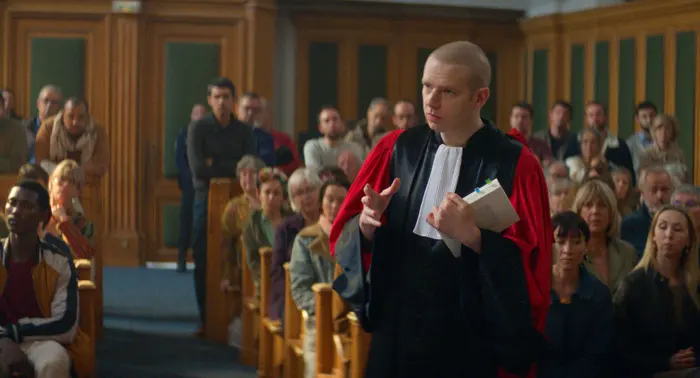Introduction
French cinema has long been fascinated by the courtroom drama genre, delving into themes of justice, law, and human nature. In recent years, a new wave of French arthouse films has emerged, subverting and reinventing the traditional courtroom drama. These films, such as “Anatomy of a Fall,” “Saint Omer,” and “The Goldman Case,” have captivated audiences and critics alike with their unique perspectives and exploration of faultlines in French society. By raising questions about gender, race, prejudice, motherhood, and relationships, these films offer a fresh take on the courtroom drama genre.
A Renaissance of French Auteur Films
The resurgence of French auteur films exploring the courtroom drama genre can be traced back to notable works such as “Anatomy of a Fall,” “Saint Omer,” and “The Goldman Case.” These films have garnered critical acclaim and awards, reflecting a growing audience captivated by questions of law and justice in French society. The directors behind these films are subverting the traditional conventions of the genre to offer thought-provoking narratives that challenge societal norms.
Anatomy of a Fall: Exploring Chaos and Relationships
“Justine Triet’s ‘Anatomy of a Fall’ portrays the chaos of a relationship within the context of a criminal trial.” Triet takes an unconventional approach to filming the courtroom trial, using gaps, flashbacks, and no omniscient point of view. The film’s director believes that the judicial system is a space where society tries to organize and understand the chaos of our lives. Through her unique storytelling technique, Triet raises questions about the complexities of relationships, highlighting the power dynamics and emotional turmoil within them.

Saint Omer: Motherhood and Society
Alice Diop’s “Saint Omer” takes inspiration from a real-life courtroom trial to explore the relationship between women and motherhood. The film is based on the fictional retelling of the 2016 trial of a Senegalese student accused of infanticide on the northern French coast. Diop uses real courtroom transcripts to create a fictionalized account of the trial, inviting the audience to question their own perspectives. By delving into the complexities of motherhood, Diop sheds light on societal expectations and the challenges women face in balancing their identities as mothers and individuals.
The Goldman Case: Justice and Activism
In “The Goldman Case,” director Cédric Kahn reconstructs a 1970s French trial of left-wing activist Pierre Goldman, who was accused of killing two pharmacists during a hold-up in Paris. This film offers a homage to justice and the difficulty of meting out justice. It also pays tribute to lawyers who tirelessly advocate for their clients. By focusing on a historical trial and the activism surrounding it, Kahn explores themes of justice, activism, and the complexities of human nature.
French Cinema’s Fascination with Courts and Trials
The fascination with courts, investigations, and legal arguments in French cinema dates back to the early days of the medium. From Georges Méliès’ 1899 silent film on the Dreyfus affair to more recent cases like the Outreau child abuse allegations and the murder of “little Grégory,” French cinema has consistently explored unresolved crimes, acquittals, and miscarriages of justice. These stories have captured the imagination of audiences, showcasing the enduring interest in trials and the human stories behind them.
Subverting the Genre: Innovative Approaches to Writing and Shooting

What sets the recent wave of French arthouse films apart is their innovative approach to writing and shooting. These filmmakers use the courtroom drama genre as a platform to tackle contemporary issues resonant in society. They address topics such as motherhood, race, gender roles, and antisemitism, challenging viewers to confront different perspectives and societal contradictions. By subverting the genre’s traditional narrative structure, these films offer a fresh and thought-provoking take on courtroom dramas.
A Platform for Voices: Exploring Innocence and Guilt
“These films show a fascination for trials, as they intrigue people with their stories and the question of innocence,” says Michèle Bauer, a lawyer in Bordeaux. The recent arthouse hits create a platform for the accused to have their voices heard, allowing audiences to question their guilt or innocence. The realistic portrayal of the accused’s struggles and isolation in the courtroom reflects the challenges faced by those caught in the midst of a murder trial. By emphasizing the human experience, these films delve into the complexities of justice and the impact it has on individuals.
Tension and Social Divisions: Reflecting French Society
Nicolas Thévenin, a film lecturer and director of the film publication Répliques, believes that these films reflect the tensions and social divisions present in contemporary French society. He suggests that the courtroom drama genre offers a unique opportunity to confront different points of view and address social contradictions. The recent years have seen a heightened tension in France, marked by differences over religion, gender, and politics. Through the lens of the courtroom drama, these films provide a platform to explore and challenge these societal divisions.
Conclusion
The evolution of French courtroom drama in arthouse films has ushered in a new wave of thought-provoking narratives. Filmmakers like Justine Triet, Alice Diop, and Cédric Kahn have subverted the genre’s conventions to explore faultlines in French society. By raising questions about gender, race, prejudice, motherhood, and relationships, these films offer a unique perspective on justice and the complexities of human nature. As French cinema continues to captivate audiences with its exploration of the courtroom drama genre, it provides a platform for voices to be heard and societal tensions to be confronted.
